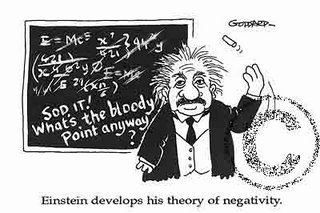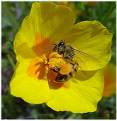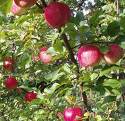
It won't surprise you to hear that I have something of an issue with the Meat Council's ads starring the previously respectable Sam Neill proposing that the ingestion of Red Meat somehow makes you smarter.
I have heard some fallacious and ungrounded arguments in my time, but this one really takes the cake.
According to the ads, we were 'meant to eat it' (determinism?) and in the print versions, gracing such trustworthy publications as "Women's Weekly", it's 'as natural as drinking water'.
Anymore of this twaddle and Cuchulain's battle-fury will seem like a bit of a tanty in comparison to my reaction.
For starters, let's look at 'it's as natural as drinking water'. Weeelll, there is one small difference,-water is essential to continued existence,-red meat isn't. If it is, I am superhuman and something of a scientific anomaly in that I have survived without it for 16 years of my life. Am I a freak of nature or could it be that they are WRONG?
Secondly, there is nothing in our physiology, past or present that suggests we are in any way primarily adapted to eat flesh. Please pick up your anatomical comparisons textbook and have a quick squiz at the carnivorous digestive tract. Now have a look at ours. Hmmm, doesn't look very similar does it now?
Now, the main beef (...), 'eating meat made us smarter'. Of all the ridiculous and uscientific statements ever made... (Grr, argh, retch, spit, rend, wail, snap, snarl). The human, or
Homo, genus emerged during the Pliocene. Early species of
Homo were similar in body size to
Australopihicus but had noticeably larger brains. These species were replaced by the even larger brained
H.Erectus and then, in the Pleistocene, by
H.Sapiens, which has the biggest brain of all. Prof. Katherine Milton, who has studies the dietary behaviour of indigenous human populations living in the Amazon basin, as well as field studies on the foraging behaviour of howler and spider monkeys in Panama, suggests that the striking expansion of brain size in our genus indicates that we became so successful because selection amplified a tendency inherent in the primate order since its inception: that of using brainpower, or behaviour, to solve dietary problems. Coupled with anatomic changes -and with the associations in living primates between larger brains and a high-quality diet -this increase also points to the conclusion that the behavioural solution was to concentrate on high-quality foods. It is true that
H.Sapiens during the ice age turned to animal sources for sustenance as the quality and quantity of plant-source foods became more scarce, but as Dr Milton posits,-further along in a time-line is not, in any way, a measure of greater intelligence. One has to look carefully at other indicators of intelligence such as mapping, social interraction, religion, tool-making and environmental manipulation to point us in any direction suggesting levels of 'intelligence', and in comparative studies, it cannot be claimed that ice-age
H.Sapiens made intelligent advances greater than their herbivorous predecessors.
'Eating meat makes you smarter'. Does it? Dr Carel van Schaek, suggests that the animals that are intelligent are the ones that are cultural: they learn from one another innvative solutions to ecological or social problems. Culture promotes intelligence. Primatologists define culture as the ability to learn -by observation -skills invented by others. Culture can unleash ever increasing accomplishments and can bootstrap a species toward greater and greater intelligence.
The idea that hunting and skinning meat somehow requires greater intelligence than mapping and planning gathering strategies that avoid using all available resources (early agriculture) is unfounded. It does go some way to explaining though, why men have traditionally felt that intelligence was truly their domain. Is the cattle farmer more intelligent than the wheat farmer? Even the primitive mind knew that resources were expendable, -probably more acutely than we do today as they were limited by seasonal offerings.
The socio-cultural development of
H.Sapiens in hunting, gathering and early farming contributed to the rise in human intelligence. To assert that only one of these factors is responsible is reductive and indicative of faulty logic.
Biochemically, we know that the brain is a hungry little bugger and relies primarily on Glucose for nourishment. Fruit is, and always has been the most readily available souce of brain energy for the primate family. I don't see any ads out there claiming that fruit makes you smarter,-and for good reason. This too would be a fallacious argument. Intelligence is not measured by brain-size or it's ability to absorb nutrients of any variety. Eating meat, lentils, fruit, coke, water cannot, in and of itself, make a species 'smarter'. If it could, one would assume that the incredibly efficient hunters in the carnivore family would have surpassed human intelligence long-ago (being that we are stubbornly omnivorous).
I do not, and will not ever propose that the very fact of eating meat is somehow morally 'wrong'. The human digestive system is well able to digest flesh. Intensive factory-farming and an inherent disregard for a being's 'right to life' is
in my view morally reprehensible, but it not a view that I propose as a blanket solution.
What makes me mad, is the childish assertions made by these ads. They are not scientifically grounded in any way and yet people believe them
vehemently. For chrissake, -since when was the TV a reliable source of unbiased information?
I do not ask all and sundry to give up eating meat, but I truly hope that the aforementioned start to think about the quality of the information that they are basing their dietary choices upon. Drinking Coke will not guarantee you a beach full of babes and a rockin' good time, highly processed cheese sticks are not a go choice for your child because cartoon cows hot-air balloon them into schoolyards, a KFC meal will not bring your family together in peace and jovial happiness and eating red meat WILL NOT make you smarter.
I welcome any offers of individuals brave nough to test the 'water' theory too. I suggest a trial where person (a) eats no red meat for 4 weeks and person (b) drinks no water for four weeks. I suspect the results may speak for themselves.
Grrrrrr.














